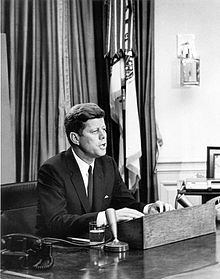- Civil Rights Address
-
 Kennedy delivers his speech from the Oval Office.
Kennedy delivers his speech from the Oval Office.
The Civil Rights Address was a speech on civil rights, delivered on radio and television by U.S. President John F. Kennedy from the Oval Office on June 11, 1963 in which he proposed the Civil Rights Act of 1964. The address transformed civil rights from a legal issue to a moral one.[1] The speech was in response to the U.S. National Guard being sent to protect African American students enrolling at the University of Alabama. "Threats and defiant statements” were made towards these students, due to their race. Kennedy stated that the National Guard was at the college “to carry out the final and unequivocal order of the United States District Court of the Northern District of Alabama.” This order called for the two qualified Alabama residents to be admitted to the university, even though they happened to have been born Negro. These students had to be backed by troops just to enter the school. In his moving speech, Kennedy called Americans to recognize civil rights as a moral cause that all people need to contribute to. This will lead to the nation finally ending unjust discrimination against African Americans. It will also provide equal treatment to all African Americans. A movement was created and led by African Americans and their allies for their Civil Rights.[citation needed] This movement reached “center stage” in American politics by 1963. President Kennedy became an ally of this movement, and added the moral weight of his Presidency to the demand for civil rights. In the Civil Rights Address, Kennedy explained the economic, educational, and moral dimensions of racial discrimination. The President announced that he would be submitting legislation to ensure equal access to the public, accommodations and to address other aspects of discrimination. Seven months after Kennedy was assassinated (July 2, 1964), the Civil Rights Act of 1964 became law. The Civil Rights Act of 1964 abolishes discrimination in public, accommodations, employment and the federally funded programs. None of these great achievements would have occurred if it were not for the Civil Rights Address that president Kennedy made on June 11, 1963.[citation needed] This speech was not only this country's first steps towards diminishing discrimination all together,[citation needed] but also it also showed discrimination (something that has been existent in many citizens’ lives to the point that it is the regular) in a new light for the public to see.
Kennedy's progressive stance is evident[says who?] in his moderating of the language of Theodore Sorensen's draft. For example, Sorensen's call for Congress "to act, boldly" "to give the enforceable right to be served in facilities which are open to the public" became Kennedy's "to act" to "give" the rights to Black Americans.[1]
Notes
External links
See also
Categories:- Speeches by John F. Kennedy
- History of civil rights in the United States
- History of African-American civil rights
- 1963 in politics
Wikimedia Foundation. 2010.
